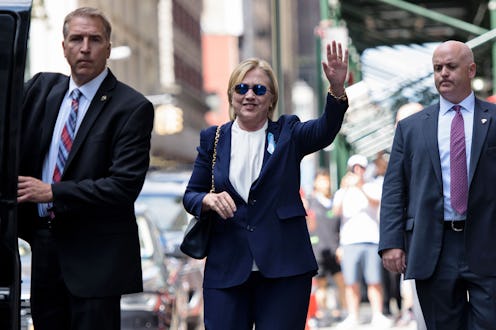News
The Clear Sexism In Reactions To Clinton's Illness
As it turns out, Hillary Clinton is not the first politician to get sick during campaign season. However, she is getting treated differently for showing signs of that illness in the first place. The reactions to Clinton fainting at a Sept. 11 memorial — especially after it was revealed that she's been diagnosed with pneumonia — have drawn two conclusions: the GOP thinks they have further evidence of her supposed physical weakness, and Clinton supporters praise her for "powering through." Both of these reactions fail in specific ways, but more importantly, no male politician's illness would be up for such scrutiny.
In a bizarre election year that has seen both the conservative fringe and mainstream jump on Clinton for her alleged physical weakness, it doesn't come as a major surprise that her campaign withheld information of her diagnosis until Sept. 11. If it were a normal election year, perhaps Clinton would simply get some well wishes and move on. But because it's 2016, her campaign likely anticipated the #HillaryForHospice hashtag that began floating around on Twitter after word of her pneumonia spread.
But Clinton isn't alone in getting sick on the trail, and as Quartz pointed out, she follows a long line of actual human politicians who have been sick. The 14th president, Franklin Pierce, became known as "Fainting Frank" after he passed out during two battles in the Mexican-American War before eventually winning his bid to the White House. George H.W. Bush vomited and passed out on the Japanese prime minister at a state dinner. And of course, Franklin Delano Roosevelt suffered from polio throughout his 12-year presidency, which The New York Times described as "a nonstarter" for voters. "As a campaign issue it never surfaced during FDR's career," the Times wrote.
Clinton's health has been a campaign issue and has only found itself compounded in the days since she fainted. When asked about her illness, Donald Trump mused that it was "interesting to see what is going on." Some of his supporters, as Media Matters pointed out, have been a bit more ruthless. A headline from The Drudge Report asked "Will She Survive?" and radio-host-turned-conspiracy-theorist Alex Jones said he was "literally in ecstasy" after watching the video of Clinton faint. "The hand of God," he ludicrously claimed, made her ill.
Democratic media, on the other hand, has largely championed her for remaining on the campaign trail. And while it certainly is astounding that she continued despite her illness, it isn't necessarily something to be praised, either.
I had pneumonia a few years ago, and after spending three weeks in the hospital, there was no way I would have ever been able to attend a campaign event. I couldn't even walk in the month after I was released from the hospital. But that idea that "that's what women do" as Salon suggested, only works to double down on this narrative that women place others, or tasks, above themselves. No one — not even women who are often praised for powering through illness — should be expected to work through pneumonia or any other sickness. We can respect their choice (and understand that many, on the same token, don't have the choice to do anything but) while still wanting to fight the expectations that working while sick is just an everyday facet of female life.
But let's face it: this discussion, from either camp, likely wouldn't be happening if the Democratic nominee was a man. On one side you have the idea that women are too frail to run for president, and on the other, women are unfairly expected to power through illness. The double standard is clear. So in an election year already fraught with bizarre twists, let's hope the pneumonia is yet another obstacle Clinton can recover from.
